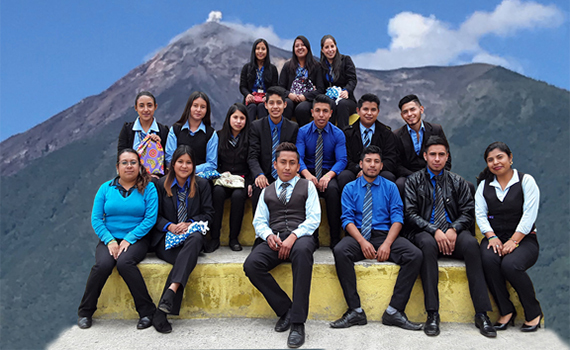
Students in Santa Lucia, Guatemala, are making soap from volcanic ash as part of the district grant project to empower students and keep them in school.
By Maureen Duncan, a member of The Rotary Foundation Cadre of Technical Advisers and a returned Peace Corps volunteer
As a member of The Rotary Foundation Cadre of Technical Advisers, I evaluate projects in Central and South America. I am also a former Peace Corps volunteer stationed in Brazil (from 1966 to 1968). These two organizations have great potential for working together to achieve amazing results. Recently, I was able to combine these two networks for a grant project that is advancing education and providing economic opportunities for youth in Guatemala.
In February of 2019, I joined Mark Balla, an Australian Rotarian and water and sanitation expert, in visiting 15 of 48 schools involved with a water, sanitation, and hygiene project funded by a global grant. One of the schools we visited was the Instituto Mixto Municipal de Diversificado, a high school in Santa Lucia, Guatemala, that prepares students for careers in secretarial science and accounting.
We were impressed by how they have incorporated saving the environment into their curriculum. We watched the students simulating real business solutions as they turned recycled trash into rugs, undertook rudimentary attempts at making renewable menstrual pads, and produced organic soap.
After returning to the US, I applied for and received a district grant for a project we called Keeping Guatemalan Girls in School to help students at the Instituto Mixto Municipal de Diversificado. The grant was made possible by donations from private donors, GoFundMe, and Rotary clubs in San Diego, California, USA and Melbourne, Australia.
The goal is to help girls in Guatemala stay in school. While elementary schools are free of cost and provide free meals, girls often drop out of school when they start their periods because of inadequate products and facilities. Even if they make it to junior high or high school, the costs for tuition, books, and uniforms force 75 percent of Guatemalan children to stop attending school. With this project, we are teaching boys and girls entrepreneurial skills so they can be self-sufficient and contribute to their communities
In September 2019, we hired a local project manager. As a returned Peace Corps Volunteer, I searched for local Peace Corps volunteers who could help, and met Lauren Devol. She is working in Guatemala to support community economic development and we developed a strong connection. Lauren is passionate about serving as a connector to empower women, youth, and indigenous populations. Although we are 50+ years apart in our Peace Corps Service and age, we couldn’t be more alike in our fundamental aspirations to help people help themselves.
By working with Peace Corps, I know that Lauren and the local project manager can be there when I can’t. They meet with the 12 students (six boys and six girls), helping them evaluate their goals and providing cheerleading. This is one of the great benefits of partnering with other organizations.
Our project at the Santa Lucia high school has two components:
Reusable menstrual pads
The students decided one of their businesses would be to make cloth-based, reusable menstrual pads, knowing that disposable ones are bad for the environment and too costly for the majority of girls and women. Using a design the students came up with, we are paying a seamstress in the community to cut and sew the protectors and pads, fulfilling the requirement to include the community in economic development. The emphasis of this endeavor isn’t mainly a moneymaking one, but rather education as the students instruct girls and women in Santa Lucia and nearby communities.
Making soap from volcano ash
Volcanoes are everywhere in Guatemala; many of them still active and destructive. We believe, by targeting tourists from nearby Antigua, that we can make a profit by selling soap made with local ingredients, including volcanic ash. Lauren has been most helpful in monitoring the students’ activities: experimenting with local ingredients, packaging, marketing, and sales. She and the local project manager even went on a hike with the students up a nearby volcano to get some volcanic ash! This will be the students’ first step toward self-sufficiency. The money from sales will buy more materials and cover some of their education expenses, as well as helping the local community,
The grant ends in April 2020 – a short time. But it will provide stimulus for potential future grants. We have changed lives already, which we can see through the smiles on the faces of the students, the enthusiasm of the seamstress, and the positivity reflected in the entire school. But mostly, the lives of Lauren and I have been enriched beyond words.
https://blog.rotary.org/2020/02/19/rotary-peace-corps-working-together/
